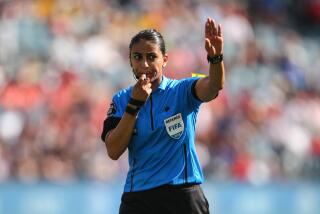Rinus Michels, 77; Dutch Coach Was a Towering Figure in International Soccer
- Share via
Rinus Michels, “the father of Dutch football” and one of international soccer’s towering figures, has died. He was 77.
Michels died Thursday at a hospital in Aalst, Belgium, two weeks after undergoing heart surgery.
Affectionately known as “the General” or “the Sphinx” because of his stern manner on the field, Michels was a warm and humorous character off it.
He coached the Los Angeles Aztecs of the North American Soccer League in the late 1970s but achieved his greatest fame with Holland’s Ajax Amsterdam and Spain’s Barcelona teams, as well as the Dutch national team.
Johan Cruyff, one of soccer’s legendary players who starred on all four of those teams, said Michels’ impact was tremendous and lasting.
“I always greatly admired his leadership,” Cruyff said on his website. “He was always very clear in what he wanted and what he expected from you.... There is nobody who taught me as much as him. I will miss Rinus Michels.”
Before Michels, Dutch soccer wallowed in the backwaters. With his rise to coaching prominence, phrases such as “total football” and “clockwork orange,” describing the foe-distracting style that allowed players to change positions in mid-play, became part of the soccer vocabulary.
Both innovative and inspirational, Michels was named coach of the century in 1999 by FIFA, world soccer’s governing body.
“There is no one in the game who does not think of him as one of the greatest coaches there has been,” said Sven-Goran Eriksson, the Swedish coach of England’s national team.
“He built the foundations for the great Ajax teams of the 1970s, and then took that success to the Dutch national team. The 1974 World Cup and 1988 European Championship teams were both tactically and technically fantastic, playing wonderful attacking football.”
Marinus Hendrikus Jacobus Michels was born Feb. 9, 1928, in Amsterdam.
When he was 18, he made his debut for Ajax, scoring five goals for the team that he would lead to worldwide fame, first as a player and later as a coach.
In all, he played 269 games and scored 121 goals for Ajax from 1946 to 1958, winning Dutch championships in 1947 and 1957. He also played five games for the Dutch national team before retiring at age 30, when back problems forced him to the sideline.
After a stint in the army and as a physical eduction teacher at a school for the deaf, he turned to coaching and eventually became coach of Ajax in 1965.
Under Michels, Ajax won Dutch championships in 1966, 1967, 1968 and 1970, the Dutch Cup in 1967, 1970 and 1971, and the coveted European Cup in 1971.
Behind all these successes was a system under which players were not locked into their positions but were free to interchange roles and improvise.
When it worked, the freewheeling style was beautiful to watch, and Michels carried it over to the orange-clad Dutch national team, whose fluid attacking play gave rise to the “clockwork orange” moniker.
In 1974, with players such as Cruyff, Ruud Krol, Rob Rensenbrink and Johan Neeskens, the Netherlands swept all the way to the final of the World Cup in Germany, only to lose soccer’s ultimate prize to the host nation, 2-1.
In 1988, Michels gained his revenge and achieved his greatest triumph when the Netherlands, featuring such standouts as Ruud Gullit, Marco Van Basten, Frank Rijkaard and Ronald Koeman, won the European Championship. That the Dutch defeated old rival Germany in the semifinals made the victory all the sweeter.
In between those highlights, Michels spent a couple of years coaching in Los Angeles. Besides Cruyff, one of the Dutch players Michels brought with him was Ajax’s Thomas Rongen, now the coach of Chivas USA, the Major League Soccer expansion team in Los Angeles.
“One of the things I admired about him was his ability to get the best out of every player,” Rongen said. “Discipline was important to him, but he allowed players the freedom to express themselves.”
Michels also had a sense of humor. Last year, during a celebration of the 50th anniversary of professional soccer in the Netherlands, Michels was honored. “I am especially happy with the fact I have been able to help make the Dutch way of playing famous all over the world,” he said. “If I had a tail, I would wag it.”
More to Read
Go beyond the scoreboard
Get the latest on L.A.'s teams in the daily Sports Report newsletter.
You may occasionally receive promotional content from the Los Angeles Times.






